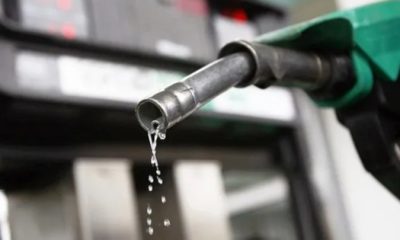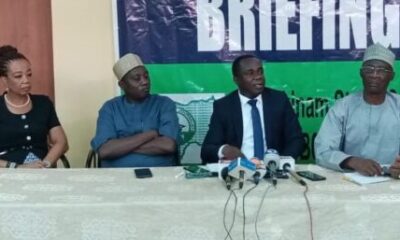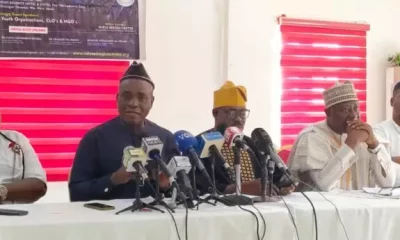Headline
Fuel Price Hike: Oil Marketers Rake In Over N21.8bn Daily
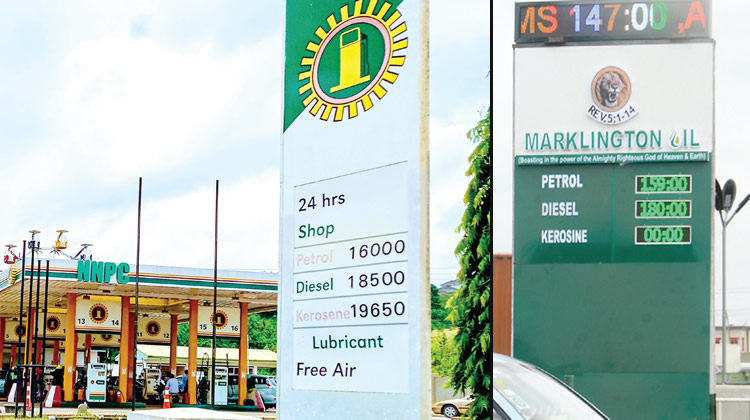
Oil marketers in Nigeria may have made an excess of N21.8834 billion in a day following the removal of subsidy on Premium Motor Spirit (PMS) popularly called petrol or fuel investigation by Saturday Telegraph has revealed.
President Bola Tinubu had in his inaugural address as the 16th President of Nigeria declared that the petrol subsidy was gone.
The Nigerian National Petroleum Company Limited (NNPCL) subsequently increased its petrol pump price template from between N184 and N194 to between N488 and N550. Using the last published PMS weekly evacuation and dispatch report of NNPCL, the average daily evacuation/dispatch for the week of April 1-7, 2023 was 68.39 million litres; while that of the week of 25th to 31st March 2023 was 73.71ml.
With the addition of 68.39 million litres and 73.71ml, the total is 142.10ml resulting in an average of 71.05ml. The NNPCL stations prior to the price adjustment sold at the pump price of about N184 while some marketers sold at an average of N200. The average of the two is N192. Multiplying the estimated 71.05ml by N192 equals N13.6416 billion.
With the current template, using N500 as a base will give a total of N35.525 billion. Subtracting N35.525trn from N13.6416 equals N21.8834 billion But the Executive Secretary of the Major Oil Marketers Association of Nigeria, (MOMAN), Mr Clement Isong, in an interview with Saturday Telegraph, said the NNPCL did not make extra profit.
He stated that NNPCL was selling at a subsidised rate instead of the actual cost but is now selling at the actual market rate. Isong also explained that other marketers should not sell their stock at such a price that they would not restock at the same quantity.
He noted that it is important for businesses to stay afloat rather than for the operators to sell at a loss, go out of business and become poor and hungry. Isong said: “NNPCL’s old stock was bought at a higher price and they were selling it at a subsidised rate.
“The old stock was not cheaper. It was higher. They were buying at N10 for instance and were selling at N5. “If you say they have old stock, was the old stock not N10? Are you suggesting that they should continue to take the loss that has reached about N2.7 trillion or lose more? “That old stock was more expensive than what they were selling it and now they want to sell the old stock at the correct price so that they can reduce the burden on the country and the burden on our collective future.
“With respect to the man that has one filling station, to buy a truck of PMS costs him about N8.3 million. “Maybe his profit was N300,000.00. Today that product is N488 in Lagos multiplied by 450,000 litres in a truck, which is N22m. Where will he find the N22 million to replenish his stock if he sells at N8 million? “Every businessman, buys, sells, and monitors his replacement cost so that he will have working capital to stay in business.
“If he finishes selling the product at N8m and so does not have money to buy the next quantity of stock, will he keep the N8 million in a bank account, sit down and have nothing to do? “The station will be dry. Businessmen that behave like that are the ones that run out of business. Every good trader, in any business line, in the world, knows this.
“It is not the profit that you are looking at, it is your continuing in business that you are looking at and you need the working capital to buy what you are selling, whether it is shoes, trousers, cars or food. “If you do not generate the money to buy your replacement stock, especially when the jump is this high, that businessman will run out of business and nobody will pity him.
He will only pity himself. “He has to look after himself. He has to be in business and if at the end of the day, he goes out of business, it will not be good. We want him to stay in business. “We do not want him to run dry and become another hungry mouth in Nigeria.”
Headline
Fagbemi warns against obstructing EFCC from performing its lawful duty

The Minister of Justice, Lateef Fagbemi, SAN has warned against obstructing the Economic and Financial Crimes Commission (EFCC) from carrying out its lawful duty .
Fagbemi’s warning is contained in a statement in Abuja.
“This is a matter of very grave concern, it is now beyond doubt that the EFCC is given power by the law to invite any person of interest to interact with them in the course of their investigations into any matter, regardless of status.
“Therefore, the least that we can all do when invited, is not to put any obstruction in the way of EFCC, but to honourably answer their invitation.
“A situation where public officials who are themselves subject of protection by law enforcement agents will set up a stratagem of obstruction to the civil and commendable efforts of the EFCC to perform its duty is to say the least, insufferably disquieting’’.
He added that running away from the law will not resolve issues at stake but only exacerbate them.
“Nigeria has a vibrant judicial system that is capable of protecting everyone who follows the rule of law in seeking protection.
“I therefore encourage anyone who has been invited by the EFCC or any other agency to immediately toe the path of decency and civility by honouring such invitation instead of embarking on a temporising self-help and escapism.
“This can only put our country in bad light before the rest of the world’’.
He said institutions of state should be allowed to function effectively and efficiently.
“I stand for the rule of law and will promptly call EFCC, and indeed any other agency to order when there is an indication of any transgressions of the fundamental rights of any Nigerian by any of the agencies’’.
NAN reports that the EFCC had on Wednesday warned members of the public that it was a criminal offence to obstruct officers of the Commission from carrying out their lawful duties.
Section 38(2)(a(b) of the EFCC Establishment Act makes it an offence to prevent officers of the Commission from carrying out their lawful duties. Culprits risk a jail term of not less than five years.
The warning , the EFCC said, became necessary against the background of the increasing tendency by persons and groups under investigation by the Commission to take the laws into their hands by recruiting thugs to obstruct lawful operations of the EFCC.
On several occasions, the anti graft agency said, operatives of the Commission have had to exercise utmost restraint in the face of such provocation to avoid a breakdown of law and order.
Headline
Unknown Gunmen Abduct Channelstv Reporter In Port-harcourt

Some unknown gunmen have kidnapped Joshua Rogers, the ChannelsTV reporter in Port-Harcourt, the Rivers State capital.
Politics Nigeria learnt that Rogers was picked up close to his residence at Rumuosi in Port Harcourt and to an unknown destination by the gunmen around 9pm on Thursday, April 11.
The reporter was driving his official ChannelsTV branded car when the hoodlums accosted, pointed a gun at him and took him away in the same vehicle.
Rogers was said to be returning from his official assignment in Government House after a trip to Andoni for a government event when the incident happened.
Already, the gunmen were said to have contacted his wife and demanded a N30million ransom for bis release.
His cameraman confirmed the incident and appealed to his abductors to set him free unconditionally.
-
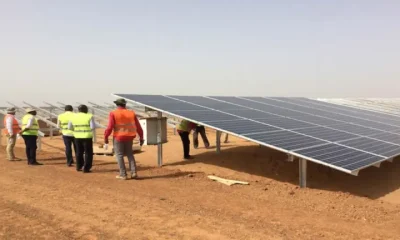
 News6 days ago
News6 days agoFG To Provide Solar Subsidy In Nigeria Through $750 Million World Bank Loan
-
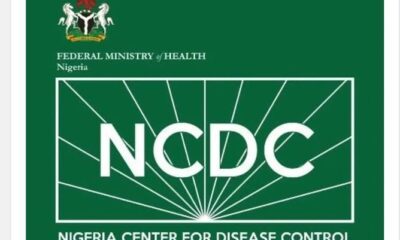
 Headline6 days ago
Headline6 days agoLassa Fever Kills 150 In Nigeria — NCDC
-
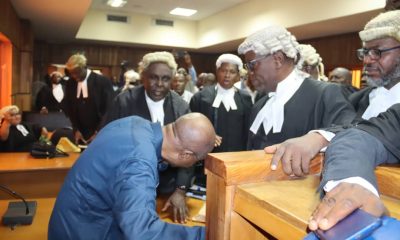
 News6 days ago
News6 days agoLagos Court Grants Emefiele N50m Bail
-
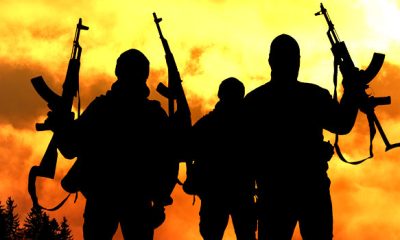
 Headline6 days ago
Headline6 days agoUnknown Gunmen Abduct Channelstv Reporter In Port-harcourt
-

 News6 days ago
News6 days agoBreaking…Naira abuse: Court sentences Bobrisky to 6 months in custody
-

 Foreign6 days ago
Foreign6 days ago3 teens arrested in Germany for allegedly plotting terror attack
-

 Business10 hours ago
Business10 hours agoSeplat Energy celebrates a decade of Dual Listing with Bell Ringing Ceremony at Nigerian Stock Exchange

